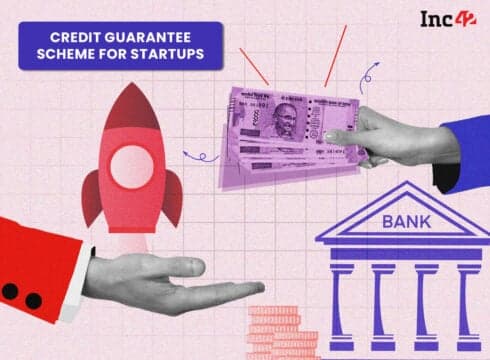The CGSS scheme will provide credit guarantees up to INR 10 Cr against startup loans issued by lending institutions
With this scheme, the government aims to provide the said credit guarantee (for startups) to lending institutions including banks, financial institutions, NBFCs and AIFs
The notice stated that startups can avail loan under the CGSS scheme only if the DPIIT-recognised startups have generated stable revenue in the last 12 months, and are not in default with any lending institution or termed as a non-performing asset
Inc42 Daily Brief
Stay Ahead With Daily News & Analysis on India’s Tech & Startup Economy
The Indian government has approved the credit guarantee scheme for startups (CGSS). The CGSS scheme will provide credit guarantees of up to INR 10 Cr against startup loans that are issued by lending institutions.
Under this scheme, the government aims to offer the said credit guarantee (for startups) to lending institutions including banks, financial institutions, NBFCs and alternative investment funds (AIFs).
“The broad objective of CGSS is to provide guarantee up to a specified limit against credit instruments extended by member institutions (MIs) to finance eligible startups. This scheme would help provide the much-needed collateral-free debt funding to startups,” the ministry’s notice stated.
The notice further stated that startups can avail loan under the CGSS scheme only if they are recognised by the DPIIT, have generated stable revenue in the last 12 months, and are not in default with any lending institution or termed as a non-performing asset.
Besides, startups that meet the cited criteria also need to be certified by lending institutions. Here, the certification will imply that such startups meet CGSS eligibility criteria.
Further, as per the notice, lending institutions that will issue loans under the CGSS scheme have to meet the following criteria:
– Lending banks should be scheduled commercial banks and financial institutions
– Lending AIFs should be registered and approved by regulatory body SEBI
– Lending NBFCs should be registered with the RBI. It also needs to have BBB ratings from RBI-recognised credit rating agencies and a net worth of up to INR 100 Cr.
In essence, scheduled commercial banks refer to banks that are included in the second schedule of the Reserve Bank of India (RBI) Act 1934. Regional rural banks and cooperative banks are excluded from the scheduled banks’ list.
CCGS Scheme Covering Lending Institutions
As per the government notifications, lending institutions can avail guarantee cover against startup loans. For this, a lending institution needs to sign a contract with the board of National Credit Guarantee Trustee Company Ltd, which is trustee of the CGSS scheme.
“A lending institution shall not be entitled to a guarantee in respect of eligible loan or venture debt facilities granted by it unless it has entered into an agreement with the Trustee or submitted an undertaking to the Trustee in such form as may be required by the Trustee,” the notification stated.
The notification further said that the trustee (National Credit Guarantee Trustee) will offer two types of guarantee covers–transaction-based guarantee and umbrella-based guarantee cover to the lending institutions.
Transaction-based guarantee cover refers to the guarantees offered to the lending institutions on the basis of a single loan borrower (startup). For availing this guarantee cover, lending institutions will have to pay an annual guarantee fee (AGF) of 2% p.a. of the disbursed loan amount to the trust.
On the other hand, umbrella-based guarantee cover refers to the guarantee offered to a lending institution for a group of loan borrowers ( a cohort of startups). To avail this guarantee cover, lending institutions have to pay an annual commitment charge (ACC) of 0.15% p.a of the proposed investment to the CGSS trust.
Govt Backing Startups Across Diverse Sectors
The latest development comes a week after the Centre launched its digital commerce project ONDC in Bengaluru. Through this, the Centre aims to provide fair play and equal opportunities to all digital players in the Indian ecommerce space.
After ecommerce, the EV sector is also getting a lot of government support. For example, the Centre introduced the faster adoption and manufacturing of electric vehicles (FAME) policy in 2015 and FAME policy II in 2019. Besides, state governments including Delhi, Maharashtra and Tamil Nadu also introduced initiatives to back EV startups.
Besides, the Centre is also closely monitoring fire incidents of electric vehicles. In connection to that, it is said to be coming up with new standards for EV batteries in some time.
In September, the union minister of MeitY Rajeev Chandrasekhar informed that the Indian government is planning to offer financial assistance to bootstrapped startups.
Prior to that, MeitY’s secretary Alkesh Kumar Sharma said that the Centre is planning to promote over 10,000 startups in the next five to six years under its new initiative Gen-Next Support for Innovative Startups (GENESIS).
As per DPIIT’s estimates, there are more than 73,000 recognised startups working in the country. These startups are generating an average of 11 jobs for the country’s youth.
{{#name}}{{name}}{{/name}}{{^name}}-{{/name}}
{{#description}}{{description}}...{{/description}}{{^description}}-{{/description}}
Note: We at Inc42 take our ethics very seriously. More information about it can be found here.


